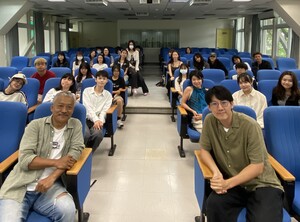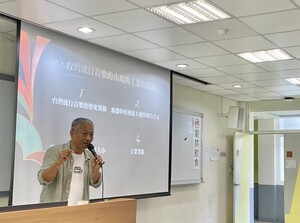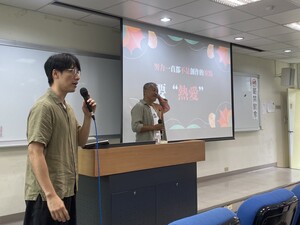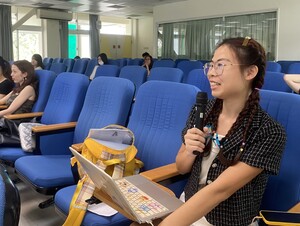





【Article by IMICS】
On April 18, the College of Communication at National Chengchi University (NCCU) welcomed veteran musician Mr. Hsieh Ming-Yu to campus for the International Leadership Course to give the talk titled: “Finding Their Own Tune: How Taiwanese Songwriters Carve Their Path” Hsieh Ming-Yu shared insights on how music creators can carve out a space for themselves within the contemporary music industry. A Golden Melody Award winner for Best Taiwanese Male Singer and Best Taiwanese Album, Hsieh is known for blending folk music with Taiwanese language and culture. He has long been committed to local expression and creative freedom, and is one of the few pop musicians in Taiwan who consistently writes in their mother tongue.
The talk began with a historical overview of Taiwan’s pop music evolution. Hsieh pointed out how, in earlier times, the spread of music was constrained by geographical barriers. He explained, “Back then, the traditional tunes of the Amis and Puyuma tribes were only popular within their own communities. It was extremely difficult for these songs to reach other tribes.” As a result, the reach of music was very limited. It wasn’t until the 1920s, with the invention of vinyl records and gramophone amplifiers, that music moved beyond oral transmission and live performance. This technological breakthrough enabled sounds to be recorded, preserved, and shared—opening up a new stage for music creation.
In the 1930s, the rise of the film industry brought about a closer connection between music creation and market demand. The theme song of the film Peach Blossom Weeps Blood became Taiwan’s first popular song, widely loved by the public at the time. It played a key role in opening up the early record market for songs and marked a turning point where music transitioned from being a form of pure cultural expression to becoming part of a commercial structure. As a result, its influence on society and culture grew significantly.
When discussing how creators can bring their music into the market, Hsieh stated bluntly, “Your work has to be understandable to others—only then can it become popular.” He emphasized that in order to be recognized, creators must first be heard by industry professionals. Only then can they overcome the limitations of regional dissemination. For artists to make a living from their work, they must enter a broader market and generate tangible income. He further explained that songwriting isn't just about self-expression—it’s crucial to consider, “Who is this song written for?” Songwriters must understand a singer’s vocal characteristics, preferred genres, and vocal range.
However, Hsieh stressed that creative skill alone isn’t enough for long-term survival in the music industry. “A creator has to be able to survive in order to continue existing in the market,” he said. Hsieh noted that the first lesson he learned when training to be a producer wasn’t about deepening his music knowledge—it was learning how to manage budgets. He mentioned that many pop artists in the past failed to manage their finances wisely, and eventually faded from the industry due to overly lavish lifestyles.
In addition to financial management, uniqueness is also a key factor in determining whether a singer-songwriter can survive in the industry. Having a distinctive lyrical and musical style is one of the essential elements that allow a creator to leave a lasting impression. When asked how to develop a personal style in lyric writing, Hsieh Ming-Yu explained that it can start from admiration for a particular singer, gradually moving toward imitation. “But just thinking someone’s lyrics are amazing and always stir my heart — that’s not enough,” he said. What truly matters is understanding why those lyrics are moving — what are the keywords that make them resonate?
“If the listener can vividly picture scenes through the lyrics and melody, that kind of work will definitely get noticed,” he added. Hsieh emphasized that creators should strive to express their personal style, allowing audiences to recognize their work through their lyrics and melodies — that is how one stands out from the rest. He also observed that when a piece lacks genuine creative motivation and merely chases popularity, it will soon be forgotten by the public.
At the end of the lecture, Hsieh offered a word of advice: “If you're going to be a singer, then be one wholeheartedly. You are an important messenger of a song—using your unique voice and singing style to reach the audience is one of the most important missions of your life.”
Delivered in his signature sincere and straightforward tone, Hsieh’s talk gave young creators not only practical tips on songwriting, but also a valuable dose of real-life experience on how to keep going.